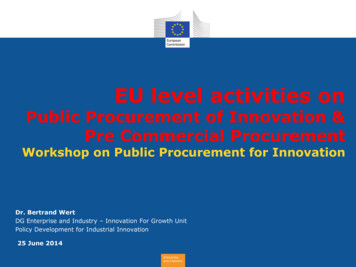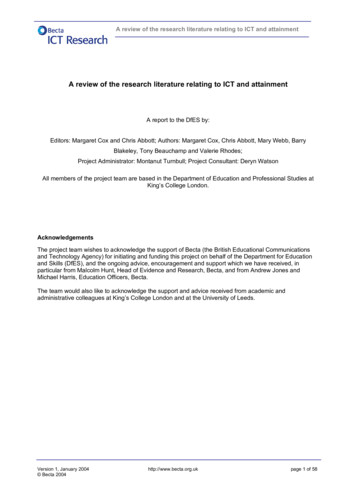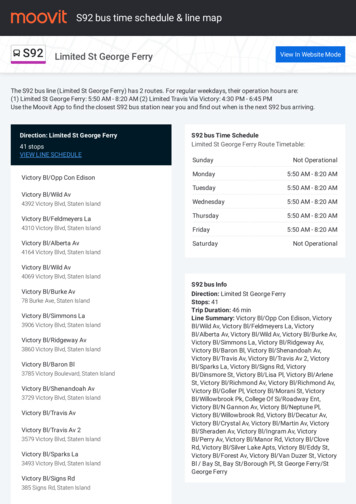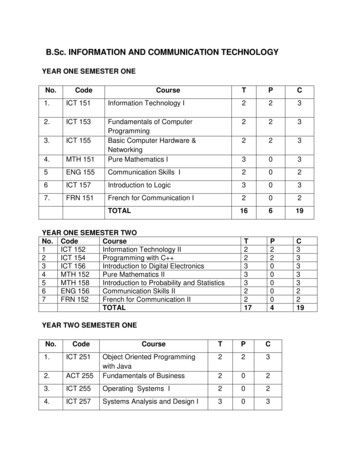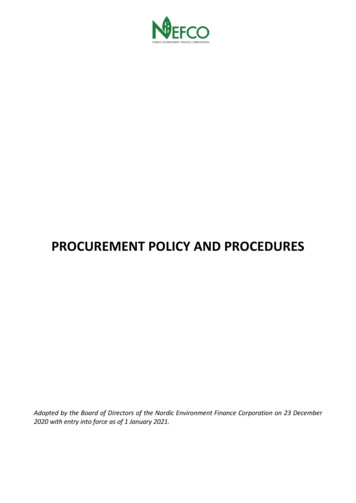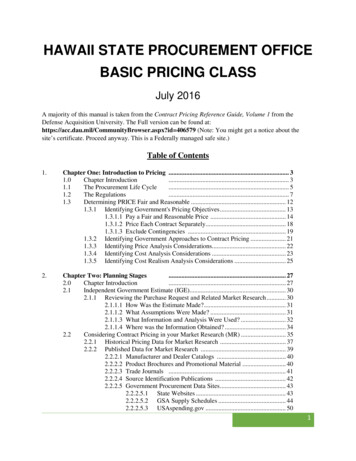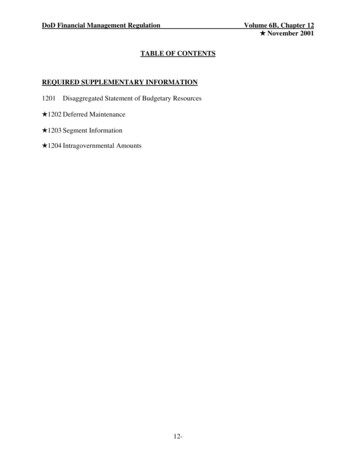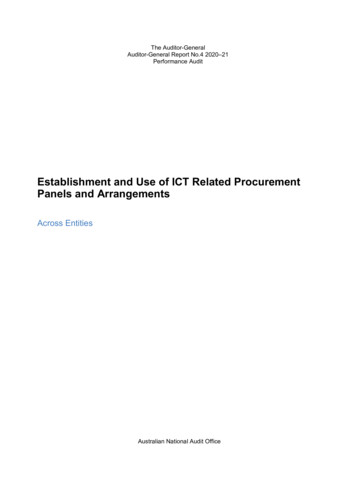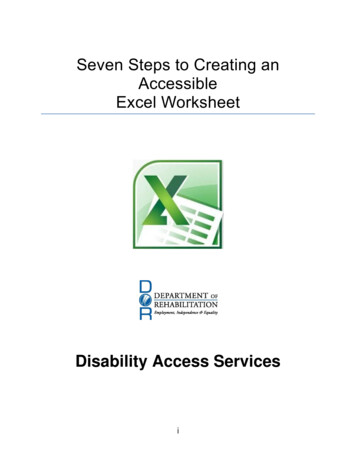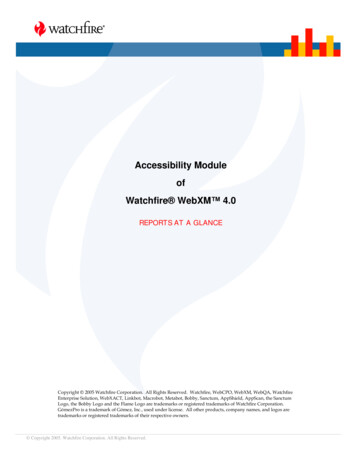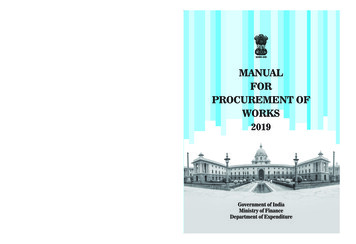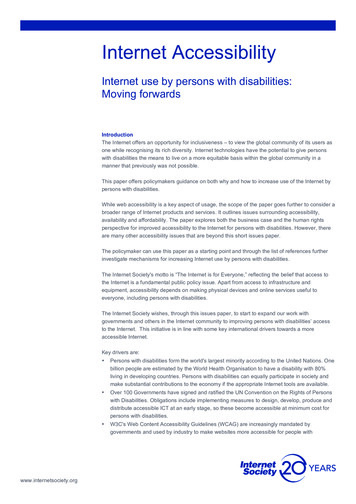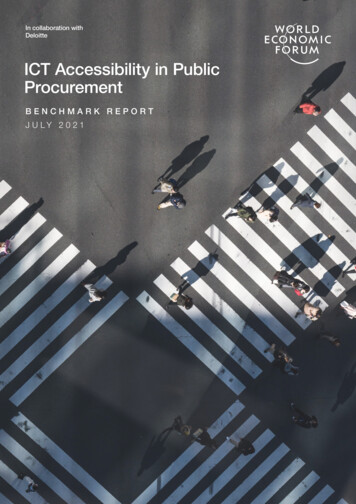
Transcription
In collaboration withDeloitteICT Accessibility in PublicProcurementBENCHMARK REPORTJ U LY 2 0 21
July 2021ICT Accessibility in Public ProcurementThis publication forms part of a suite of benchmark reports produced by the G20 Global Smart CitiesAlliance to analyse trends in smart city governance across the 36 Pioneer Cities of the Alliance.IntroductionAccessibility refers to how products, systems,services and facilities can be accessible to apopulation with the widest range of characteristicsand capabilities. Information and communicationstechnology (ICT) should be accessible to everyone,including individuals with physical/mentaldisabilities, elderly people and immigrants withlimited proficiency in the local language. The modelpolicy for ICT accessibility provides an enablingframework to support the public procurement/development of accessible ICTs.Some 29 Pioneer Cities provided details about theirICT accessibility policies. Figure 1 shows the extentto which a policy for ICT accountability has beenadopted in these Pioneer Cities.Key findings––Accessibility in public services requires theadoption of ICT accessibility standards.Less than 20% of Pioneer Cities regularlyuse ICT accessibility standards inprocurement (5/29 cities).1Pioneer Cities are verifying conformancecriteria (6/29 cities).2–City officials need training to embedaccessibility into ICT procurement. However,most Pioneer Cities are not training cityofficials (9/29 cities).3–Adopting the model policy for ICT accessibilityin procurement policies–Involving the ICT procurement function indeveloping a procurement policy for ICTaccessibilityProcurement needs to be supported byverification of conformance by vendors. FewThe current state of playEven though accessibility standards are wellestablished in the Pioneer Cities, very few citiesappear to use them in the procurement of ICT.As a result, there is a risk of large sections of thepopulation being excluded. However, having awritten policy in place appears to prompt actiontowards implementation. Cities shouldtherefore consider:More guidance on these points can be found in themodel policy.ICT Accessibility in Public Procurement2
FIGURE 1Adoption and implementation of policies for ICT accessibility in public procurementCities with a written policy4,5Cities with policies implemented6,7Yes withevidence (13)45%Yes withevidence (9)31%10%Yes withoutevidence (3)59%55%No (16)No (17)Cities with funding/resources allocated8,9Cities interested in the model policy10,11No (16)Not sure yet (17)59%55%17%28%Not interested (3)10%Yes withoutevidence (5)Yes withevidence (8)7%24%Interested inimproving modelpolicy (2)Interested inadoptingexisting policy (7)Source: Deloitte analysis ofPioneer City Policy Assessmentdata, March 2021ICT Accessibility in Public Procurement3
ContributorsWorld Economic ForumYuta Hirayama, Project Lead, Internet of Thingsand Urban TransformationJeff Merritt, Head, Internet of Things and UrbanTransformationTakuya Masuda, Salesforce Fellow, Internet ofThings and Urban TransformationRushi Rama, Smart Cities Lead, Internet of Thingsand TransformationDeloitteMiguel Eiras Antunes, Global Smart Cities Leader,Deloitte Global, PortugalYoshitaka Tanaka, Consulting Chief StrategyOfficer, Deloitte, JapanMahesh Kelkar, Executive Manager, Center forGovernment Insights, Deloitte, IndiaThis document is published by the World EconomicForum as a contribution to a project, insight areaor interaction. The findings, interpretations andconclusions expressed herein are a result of acollaborative process facilitated and endorsed bythe World Economic Forum but whose results donot necessarily represent the views of the WorldEconomic Forum, nor the entirety of its Members,Partners or other stakeholders.Shuichi Kuroishi, Manager, Deloitte, Japan;Secondee to the ForumMiwa Ono, Manager, Deloitte, JapanOki Sakuyama, Consultant, Deloitte, JapanAcknowledgementsG20 Global Smart Cities Alliance Policy Task ForceLeads:Monica Duhem, Founder and Chief ExecutiveOfficer, HearColorsKaren Tamley, President and Chief ExecutiveOfficer, Access LivingLaura Ruby, Director, Worldwide AccessibilityPolicy and Standards, MicrosoftJames Thurston, Vice-President for GlobalStrategy and Development, G3ictMember:Yuval Wagner, Founder and President, Access IsraelContributing Pioneer �Apeldoorn, NetherlandsBarcelona, SpainBengaluru, IndiaBelfast, United KingdomBilbao, SpainBogota, ColombiaBrasilia, BrazilChattanooga, United StatesCordoba, ArgentinaDaegu, South KoreaeThekwini, South AfricaFaridabad, IndiaGaziantep, TurkeyHamamatsu, JapanHyderabad, ore, IndiaIstanbul, TurkeyKaga, JapanKakogawa, JapanKampala, UgandaKarlsruhe, GermanyLeeds, United KingdomLisbon, PortugalLondon, United KingdomMaebashi, JapanManila, PhilippinesMexico City, MexicoMilan, ItalyNewcastle, AustraliaICT Accessibility in Public Procurement4
Endnotes1.2.3.4.5.6.7.8.9.10.11.IA5.1: “Does the procuring authority make reference to ICT Accessibility standards when creatingMandatory Requirements and Award Criteria for ICT procurements?”IA5.4: “Does the procuring authority carry out verification of conformity with ICT accessibility standards inthe Call for Tender process?”IA5.6: “Does the procuring authority have a training or awareness programme in place for relevant officialsthat includes ICT accessibility?”Pioneer City Assessment Survey IA2.1: “Does your city have a written policy (or set of policies) thatmandates accessibility standards in the development and procurement of ICT?”IA2.3: “Please share a link to the most relevant document. Name of policy, relevant laws and regulations.”IA3.1: “Do your procurements and tenders for ICT typically require that accessibility standards aremaintained?”IA3.2: “Please demonstrate this by sharing this requirement in your most recent ICT procurement. Name ofproject/ investment.”IA4.2: “Are there resources or funding available in your city government to improve accessibility for ICT?”IA4.3: “Please describe these resources – funding/budget per year.”IA7.4: “Having reviewed the model policy, will your city work towards adopting the model policy or someversion of it in the future?”CPPF2.1: “Please select all model policies that your city will be working on in future stages of the PioneerProgramme (including attending workshops and developing policy proposals).”ICT Accessibility in Public Procurement5
The World Economic Forum,committed to improvingthe state of the world, is theInternational Organization forPublic-Private Cooperation.The Forum engages theforemost political, businessand other leaders of societyto shape global, regionaland industry agendas.World Economic Forum91–93 route de la CapiteCH-1223 Cologny/GenevaSwitzerlandTel.: 41 (0) 22 869 1212Fax: 41 (0) 22 786 2744contact@weforum.orgwww.weforum.org
contact@weforum.org www.weforum.org The World Economic Forum, committed to improving the state of the world, is the International Organization for Public-Private Cooperation. The Forum engages the foremost political, business and other leaders of society to shape global, regional and industry agendas.
